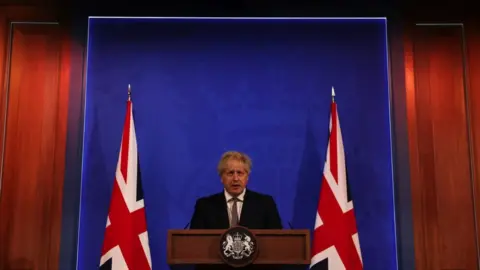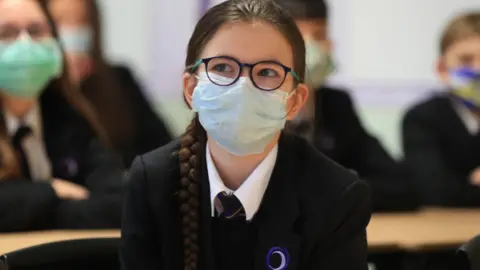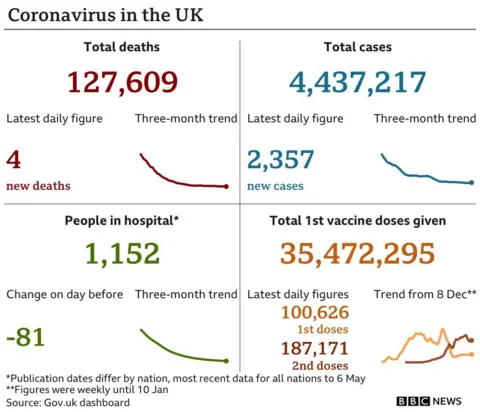Covid-19: Hugging to be allowed in England as UK alert level drops
Here are five things you need to know about the coronavirus pandemic this Monday evening. We'll have another update for you on Tuesday morning.
1. PM announces 'single biggest step' on roadmap
Boris Johnson has confirmed people in England will be able to hug loved ones, dine inside restaurants, drink inside pubs, and go abroad on holiday from next Monday. Speaking at a Downing Street news conference, he said the 17 May easing was the "single biggest step" on the roadmap so far. On hugging, people should consider the vulnerability of their loved ones and use common sense, the PM added. Zero coronavirus deaths were announced in England, Scotland and Northern Ireland on Monday, while there were four in Wales. It is likely that there were deaths since Sunday and these could be accounted for in the coming days, however. Meanwhile, people in Scotland will be able to travel to some international destinations without having to quarantine on their return, the BBC understands. The move will come into effect on 24 May. And here's some more on the science of why we've been missing hugs.
 Getty Images
Getty Images
2. UK coronavirus alert level drops
The UK's coronavirus alert level is being lowered from four to three on the advice of experts. The new level means although the virus is in general circulation, transmission is no longer high or rising exponentially. The UK moved to the highest Covid alert level - five - in January as the nation was put into lockdown and there was a real risk of the NHS becoming overwhelmed. By late February, the alert was lowered to four. Level three means there is a gradual easing of restrictions - as is happening now. You can find out more on how the UK plans to ease restrictions here.
 Reuters
Reuters
3. Face masks won't be needed in schools from next week
The wearing of face masks in secondary school classrooms in England will not be required after 17 May, the government has confirmed. Face coverings have been recommended since students returned in March, but there have been concerns they get in the way of communicating and learning. A group of scientists and teachers' unions has argued the measure should stay. Twice weekly home testing will remain to control infection rates. The government also confirmed that remaining students will return to university campuses from next Monday too, with half of students having been studying online since January.
 Danny Lawson
Danny Lawson
4. The pilgrims who turned into super-spreaders
When millions of devout Hindus gathered last month in the Himalayan town of Haridwar to participate in the Kumbh Mela festival - even as India battled a devastating second wave of coronavirus - many feared that it would turn out to be a "super-spreader event". Those fears, it now seems, are coming true, with reports of Kumbh returnees testing positive - and possibly spreading the infection - coming from many parts of the country. Epidemiologist Dr Lalit Kant said "huge groups of mask-less pilgrims sitting on the river bank singing the glories of the Ganges" created an ideal environment for the virus to spread rapidly, adding: "We already know that chorus singing in churches and temples are known to be super-spreader events." Read more here. Meanwhile, 1,000 pieces of life-saving equipment will be sent from Wales to hospitals in India to help with the Covid crisis - there's more on that here.
 Reuters
Reuters
5. What's it like going back to work?
Working from home has become a way of life for many (and if you're sick of Zoom calls, you're not alone - HSBC is to ban them on Fridays to give staff a break). But with many offices now gradually inviting staff back, we wanted to know how people are feeling about their return. Alexander Holland, a computer chip designer from Oxford, says one of the toughest challenges was the proximity of the biscuit tin. "Working from home for over a year, at a desk only a few meters away from the TV and the kitchen, with very little natural self-control hasn't been good for my waistline or my time management," he says.


And there's more...
Travel is set to return for England from next Monday. Click here for a reminder of the countries on the green list so far, meaning there are the fewest restrictions for travel.
Find further information, advice and guides on our coronavirus page.



What questions do you have about coronavirus?
In some cases, your question will be published, displaying your name, age and location as you provide it, unless you state otherwise. Your contact details will never be published. Please ensure you have read our terms & conditions and privacy policy.
Use this form to ask your question:
If you are reading this page and can't see the form you will need to visit the mobile version of the BBC website to submit your question or send them via email to YourQuestions@bbc.co.uk. Please include your name, age and location with any question you send in.

- FRESH STARTS: Follow extraordinary people who set out on courageous new beginnings
- THE MAN WHO COULD HAVE BEEN A PRINCE: Keith found out the surprising truth about his birth parents

